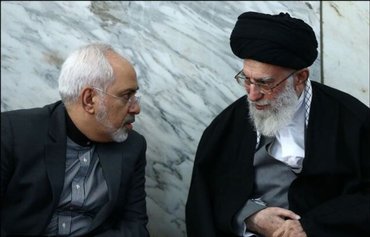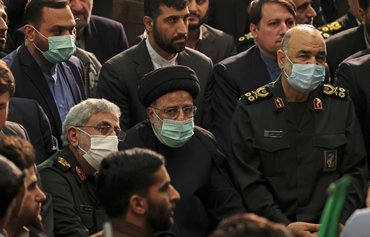Members of the Islamic Revolutionary Guard Corps Quds Force (IRGC-QF) have become so disenchanted with their lot that they are doing the "unthinkable" and selling secrets to Iran's arch rival, Israel, a leaked report reveals.
The troubles roiling the IRGC-QF, once commanded by the vaunted Gen. Qassem Soleimani, was one of the central topics of a confidential January 3 meeting in Tehran between high-ranking officials and Iranian leader Ali Khamenei.
During the meeting, the Iranian regime's concerns about rifts, disobedience and defection within the ranks of the IRGC were brought to light, and have since been widely shared, via a leaked report published by IranWire.
On March 18, the expatriate media outlet published a 44-page document that details the remarks made during the meeting, obtained from "a source in Iran" and first published on the Telegram channel Vaght-e Azadi.
![The late IRGC Quds Force commander Qassem Soleimani is pictured here in 2018, less than 40km from the Golan Heights. [Tasnim News]](/cnmi_am/images/2023/03/27/41341-IRGCQF-Soleimani-Golan-600_384.jpg)
The late IRGC Quds Force commander Qassem Soleimani is pictured here in 2018, less than 40km from the Golan Heights. [Tasnim News]
The main topic of discussion at the meeting was Iran's security situation.
In addition to discussing domestic dissent and the challenges to suppressing it, participants talked about the fragility of the IRGC-QF and the low morale among its members in the Golan Heights area on the Syria-Israel border.
Senior IRGC-QF commander Rahim Noiaghdam, who has commanded forces in Syria and was quoted in the leaked document, said the forces are fatigued and worn out, and have been selling intelligence to Israel.
'Israel's upper hand'
In the meeting, Noiaghdam said IRGC-QF personnel are facing "numerous problems" in the border areas of Israel and the Golan Heights.
"Israel's nonstop bombardments, the lack of access to allied forces in the area, ideological issues and family problems" are among the challenges these forces face in the Golan Heights, he said.
"Ideological issues" was Noiaghdam's way of describing a loss of faith in the regime and its principles, which is described as rampant among IRGC elements.
Iranian forces' operation plans have been exposed to Israeli forces, Noiaghdam said.
Israeli forces have the upper hand in the Golan Heights, he said. They set traps for Iranian operations, and have intelligence on the secret codes intended for use in operations.
These factors have weakened Iranian forces, Noiaghdam said.
"Israeli forces have pre-empted us in five operations, which has proven to us that there is [Israeli] infiltration and discord among our forces, who are unwilling to stay in border areas with Israel," he added.
As public protests continue to churn in Iran and IRGC-QF members face fatigue and burnout, some are entering "unthinkable paths", he said -- selling intelligence to Israel in order to "lighten the [financial] burden of life".
Economic challenges have been a main problem Iranian forces, like the majority of Iranians, have been grappling with.
'Concrete threat to Islamic Republic'
In his remarks during the January 3 meeting -- held on the third anniversary of Soleimani's death -- Noiaghdam emphasised that forces are no longer willing to take part in daily and weekly combat.
Meanwhile, he said, IRGC-QF personnel are conflicted and do not have "a correct understanding of the country's current status" amid domestic dissent.
Noiaghdam said forces under his command and those from other sectors of the Quds Force are fearful, and "some of them prefer to take jobs inside Iran" rather than stay overseas.
If the Islamic Republic loses the areas it has gained overseas with "years of effort", he warned, "a concrete threat to the Islamic Republic would not be out of the question".
The briefings detailed in the confidential meeting reveal the Iranian regime's desperation, both inside and outside of the country, analysts said.
The Golan Heights area has been of significant importance to the Islamic Republic for years, and the danger of losing its ability to interfere there is clearly causing fear in the IRGC command, they added.

![IRGC-QF commanders expressed concerns about disenchanted troops in a January meeting with Iranian leader Ali Khamenei. [Iran International]](/cnmi_am/images/2023/03/27/41324-Iran-IRGC-QF-600_384.jpg)






